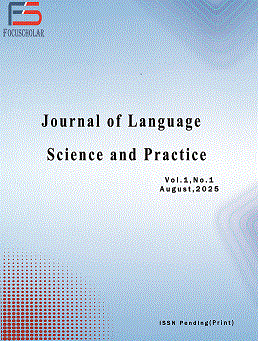About the Journal
The Journal of Language Science and Practice (JLSP) is a rigorously peer-reviewed, open-access academic journal dedicated to fostering interdisciplinary research that bridges theoretical linguistics, applied language studies, and innovative pedagogical practices. As a platform for scholars, educators, and practitioners worldwide, JLSP promotes the dissemination of cutting-edge research that advances our understanding of language structure, acquisition, teaching methodologies, and the sociocultural dynamics of language use. The journal serves as a vital resource for academics and professionals seeking to engage with contemporary debates and evidence-based approaches in language-related fields.
Scope and Focus:
JLSP embraces a broad spectrum of research topics at the nexus of language science and real-world application, encouraging submissions that contribute to both theoretical advancements and practical solutions. Key areas of interest include, but are not limited to:
Theoretical and Empirical Linguistics: Original research in syntax, semantics, phonetics, phonology, morphology, and pragmatics, with a focus on both universal and language-specific phenomena. Studies may explore formal linguistic theories, experimental approaches, or computational modeling of language processes.
Second Language Acquisition (SLA) and Bilingualism: Investigations into cognitive, psychological, and social factors influencing language learning, multilingualism, and heritage language maintenance. JLSP welcomes studies on learner variability, input and interaction, and the neurocognitive underpinnings of bilingual processing.
Language Pedagogy and Curriculum Innovation: Research on effective teaching methodologies, classroom-based interventions, and curriculum development for diverse linguistic and educational contexts. Contributions may address task-based learning, content and language integrated learning (CLIL), or the role of teacher cognition in instructional practices.
Discourse Analysis and Sociolinguistics: Examinations of language in social contexts, including critical discourse analysis, language and identity, language variation and change, and the sociopolitical dimensions of language policy and planning.
Technology-Enhanced Language Learning (TELL): Explorations of digital tools, artificial intelligence (AI), natural language processing (NLP), corpus linguistics, and virtual learning environments in language education. JLSP is particularly interested in studies that evaluate the efficacy of emerging technologies in facilitating language acquisition and literacy development.
Language Assessment and Professional Practice: Research on standardized testing, alternative assessment methods, and the implications of language assessment for educational and workplace settings.
Frequency: Semi-annual
Most Recent Issue Published: August 2025




